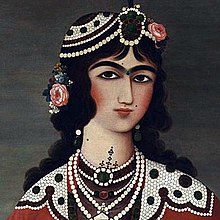Lotfollah Taraghi (Persian: لطفالله ترقی), born 1903 [1282 SH] in Qom, Iran, died 1973 [1352 SH] in Tehran, Iran,[1] was an Iranian scholar (adib), journalist, publisher, lawyer, and legislative drafting officer.[2][3] He is the father of the Iranian author Goli Taraghi.
Career as journalist
Lotfollah Taraghi was a well known landowner and in the 1940s he owned most of the Mahmoodieh area in Tehran.[4] He was patriotic in political orientation and has been described as one of the five most famous Iranian journalists in the 1941–57 period.[5] In 1929 he launched a social and literary journal, Taraghi ("Progress") and continued as its director and chief editor until its closure in 1965.[6][7] He also founded and was the editor of the literary journal Āsiā-ye javān (Young Asia) for some time.[8]
Historical fiction writings

Lotfollah Taraghi had a deep interest in historical novels and stories.[9] He is primarily known for his popular short story collection Naseroddin Shah's Love-Affairs ('Eshqbāzihā-ye Nāseroddin Shāh), which depicts the life in the harem of the Qajar king Naseroddin Shah. The stories are focused on Jeyran, the king's first mistress and subsequently favourite wife.[10]
Taraghis book Naseroddin Shah's Love-Affairs ('Eshqbāzihā-ye Nāseroddin Shāh) provided inspiration for the Iranian historical romance television series Jeyran (جیران, 2022), written and directed by Hassan Fathi.[11]
Selected work
- The Djinn in the Hamam of Sangalaj (Jenn dar hammām-e Sangalaj) (1928)[12]
- The Indian Lady (Bānu-ye hendi) (1930)[13]
- Baghdad Nights: Harun al-Rashid's Love for the Daughter of the Iranian General Azarin (Shab-hā-ye Baghdād: Deldādegi-ye Hārun be doxtar-e Āzarin sardār-e irāni) (2 vols.) (1952)[14]
- Naseroddin Shah's Love-Affairs ('Eshqbāzihā-ye Nāseroddin Shāh) (1960). Re-published several times as Jeyran and the Secrets of Naseroddin Shah's Harem (Jeyrān va asrār-e haramsarā-ye Nāseroddin Shāh)[15]
References
- ↑ Nasrollah Shifteh, Zendegināme va mobārezāt-e siāsi-ye Mohammad Mas'ud, ruznāme-mard-e emruz (The Life and Political Struggle of Mohammad Masud, A Journalist of Today), Tehran, 1984, p. 355.
- ↑ Hasan Abedini, Farhang-e Dāstān-nevisān-e Irān (Lexicon of Iranian Short Story Writers), Tehran, 1990, p. 54.
- ↑ "گلی ترقی از خودش و آثارش گفت/ «همه چیز برای من قصه است»". Mehr News Agency. January 2014. Retrieved 22 January 2023.
- ↑ Dariush Pourkian, The Battered Generation, London, 2022, chapter 1.
- ↑ Iran Nameh: Journal of the Foundation for Iranian Studies, vol. 16, Bethesda, 1998.
- ↑ Goulia Ghardashkhani, Another Place: Identity, Space, and Transcultural Signification in Goli Taragqi's Fiction, Leiden, 2018, p. 2.
- ↑ Mir Ansari, Ali (September 2019). "Taraghi (ترقی)". Great Islamic Encyclopedia. Center for the Great Islamic Encyclopedia. Retrieved 23 January 2023.
- ↑ Franklin Lewis, "Review: Winter Sleep by Goli Taraqqi (translated by Francine Mahak)", Iranian Studies, vol. 32: 1, 1999, p. 167.
- ↑ Hasan Abedini, Farhang-e Dāstān-nevisān-e Irān (Lexicon of Iranian Short Story Writers), Tehran, 1990, p. 54.
- ↑ Staci Gem Scheiwiller, Liminalities of Gender and Sexuality in Nineteenth-Century Iranian Photography Desirous Bodies, New York & London, 2016, p. 44.
- ↑ Ghavizari, Narges (September 2022). "بهترین دیالوگ های سریال جیران". Filimo Shot. Retrieved 22 January 2023.
- ↑ Goulia Ghardashkhani, Another Place: Identity, Space, and Transcultural Signification in Goli Taragqi's Fiction, Leiden, 2018, p. 2.
- ↑ Goulia Ghardashkhani, Another Place: Identity, Space, and Transcultural Signification in Goli Taragqi's Fiction, Leiden, 2018, p. 2.
- ↑ Hasan Abedini, Farhang-e Dāstān-nevisān-e Irān (Lexicon of Iranian Short Story Writers), Tehran, 1990, p. 89.
- ↑ Hasan Abedini, Farhang-e Dāstān-nevisān-e Irān (Lexicon of Iranian Short Story Writers), Tehran, 1990, p. 89.